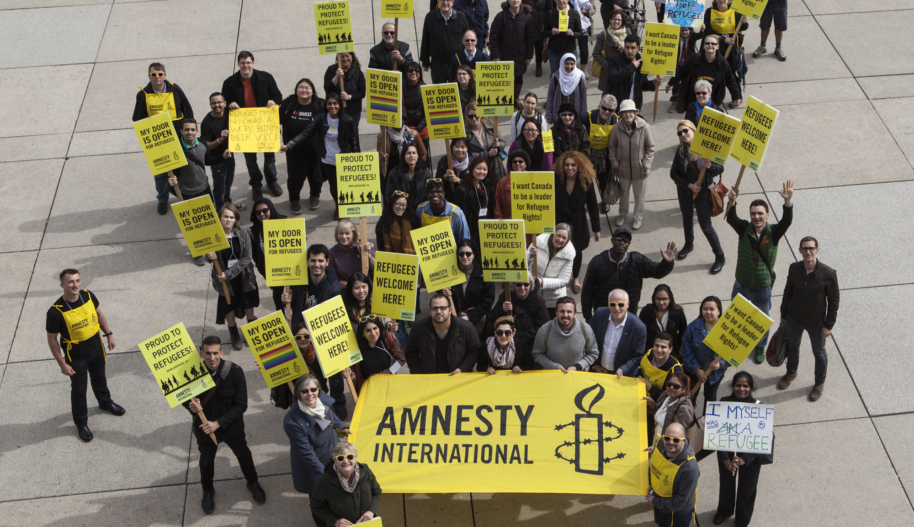As Parliament resumes and MPs and Senators set to work tackling numerous and wide-ranging challenges, Amnesty International’s 2018 Human Rights Agenda for Canada highlights a mixed record of progress in 2017 and lays out important recommendations for domestic and international human rights action over the coming year that will require more consistent political commitment, increased resources and determined leadership.
The report, Shoring up rights in a world of turmoil, notes that midway through its mandate and against a global human rights landscape marked by violent conflict and a rise in hate and bigotry, many of the Trudeau government’s more straightforward opportunities for quick progress on human rights have been realized. Much of the progress in the first two years was reflected in adopting important new policies and strategies and offering aspirational commitments. But on many human rights fronts there is a growing lag or gap between promise and action. The year ahead will require more deliberate and sustained effort to put human rights first through concrete decisions, resource allocation and a willingness to say “no” when that is what rights obligations require.
“The Trudeau government has led a number of important human rights achievements in 2017. Highlights have included new rights protections for transgender individuals, long overdue redress for four Canadian victims of national security-related abuses, the first international human rights meeting of federal, provincial and territorial ministers in 29 years, strong action on refugee protection globally and the recent announcement of the Canadian Ombudsperson for Responsible Enterprise,” said Alex Neve, Secretary General of Amnesty International Canada’s English Branch.
“But Amnesty International’s paramount assessment is that the federal government must dig deeper and commit to the heavy-lifting and principled action needed to address pressing areas of concern where progress has been notably stalled and where some decisions taken have blatantly contravened the country’ s human rights obligations. Often these challenges are politically complex and many involve powerful economic interests which far too often over-ride regard for human rights. Serious concerns include the failure to halt construction of the Site C dam in British Columbia, authorization of the $15 billion sale of armoured vehicles to Saudi Arabia, various rights violations experienced by refugee claimants and migrants within Canada, and continuing secrecy with respect to Canada’s assessments of human rights in other countries.”
Amnesty International’s report reviewed the Trudeau government’s progress toward implementation of the 35 recommendations issued in its 2017 Human Rights Agenda for Canada, released in January 2017. Of those, five have been achieved and a further seven, while incomplete, are well underway and show optimistic promise. However, uncertainty and concern clouded Canada’s progress toward implementation of another 18 recommendations, while a final five are marked by serious concerns, lack of progress or even outright failure. Overall that represents a split of encouraging progress with 1/3 of the recommendations and varying degrees of concern regarding the remaining 2/3.
In order to address these issues, the report lays out a further 33 recommendations for action in 2018 across seven themes, many of which have been updated and carried over from last year, including:
Integrating respect for the right to free, prior and informed consent into all decisions affecting the land rights of Indigenous peoples.
Developing and enacting a National Action Plan on Gender-Based Violence.
Suspending the Canada/US Safe Third Country refugee agreement.
Strengthening implementation of the Voices at Risk Guidelines to better protect and support human rights defenders, including those challenging the impact of the overseas operations of Canadian corporations.
Addressing the human rights shortcomings in the national security reforms proposed in Bill C-59.
Advancing the commitments made at the December 2017 FPT ministerial meeting to improve inter-governmental collaboration in implementing Canada’s international human rights obligations.
Developing a global human rights strategy with an overarching feminist framework that includes a commitment to consistent advocacy and increased transparency.
“The recommendations in Amnesty International’s 2018 Human Rights Agenda for Canada are all the more urgent as the Canadian government is increasingly looked to for human rights leadership on the world stage. In this time of increasing turmoil and conflict in a growing number of countries and a troubling rise in narratives of division and hatred driven by leaders prepared to undermine human rights for political expediency, it is critical that Canada brings its best to bear on the human rights front,” said Geneviève Paul, Interim Director General of Amnesty International Canada’s francophone branch. “To date, the Trudeau government has made many laudable commitments in support of human rights and implemented some very important measures. But now much of the low-hanging fruit have been picked, and we are looking to the government to show their grit by redoubling their commitment to justice, equality and human rights for all in the year ahead.”
For further information, please contact Elizabeth Berton-Hunter, Media Relations 416-363-9933 ext 332 bberton-hunter@amnesty.ca













